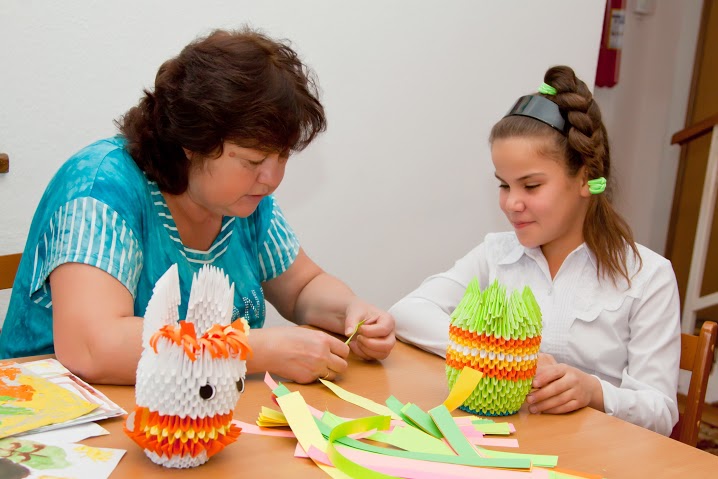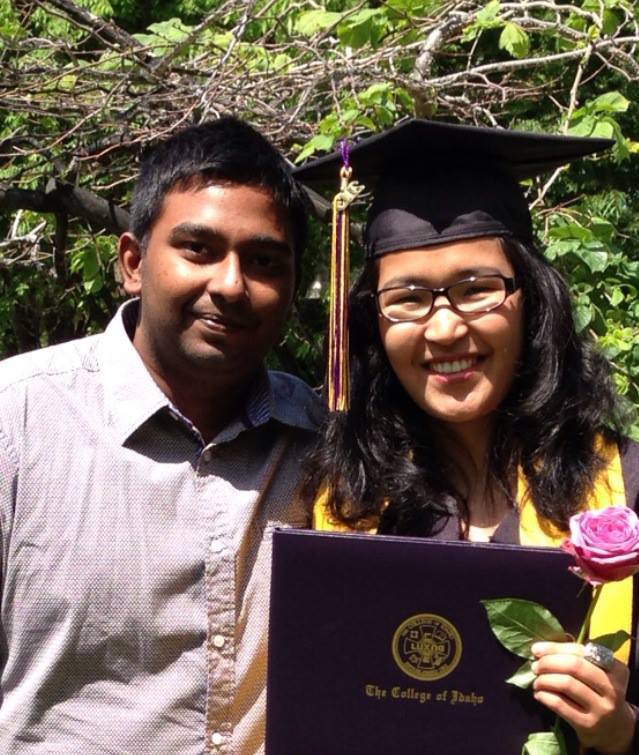A Loving Home for Every Child
By Nurzhamal Prenova and Ken Harvey, PhD
“I think that parents are not those who conceived and gave birth to you, but those who raised you and helped you to become a decent person in society, who support you all life long,” says Aliya Akhmetova, a young person raised at SOS Children’s Village Almaty. “This is what our SOS mother does. She helped, helps and will help us always. We are thankful to her for that. I resided in a nice village for 15 years. These were the most precious moments in my live, which I’ll never forget. You help us to become a person with a big heart.”

In 1993 a family-based care model, successfully tested around the world by SOS-Kinderdorf International, was brought to Kazakhstan, thanks to the first lady of the country. SOS Children’s Villages is a social organization providing a unique form of family care for children without parental care. The model is applied in 132 countries of the world. Children acquire a home with a family, get an opportunity to develop their potential, get an education, and become self-reliant members of society. Whatever they do, the child is at the center. A unique approach of the organization is to uphold long-term and resilient relationships between the SOS-mother and the children, to ensure biological brothers and sisters stay together in one SOS-family, to individualize care for each child, and to ensure that SOS-families build strong social networks within their community.
This model encompasses several stages. First the child is raised in the SOS-family; then when he reaches adulthood he is referred to the Youth Facility. After that the young person leads a semi-independent and, finally, an independent lifestyle. The NGO staff consists of 223 employees. The national office is in place to conduct oversight and strategic administration, and SOS Children’s Villages are located in Almaty, Astana, and Temirtau. The organization conducts capacity-building activities for its staff regularly, more than 720 workshops and training courses over the 21 years of operation.
At present the total number of children covered by SOS care come to 462. The number of self-sufficient young people leaving care of SOS is 47, of which 30 have already successfully created their families. One hundred sixty young people have made a decision on their future profession, gotten into or are in the process of obtaining vocational or higher education. Three young people of SOS Children’s Village Kazakhstan, thanks to their talent and abilities, have won scholarships and study abroad opportunities (Rinat Oshakbayev, Fedor Kurochkin, and Kymbat Berkalieva). Three young people take part in the work of international organizations. Svetlana Trupyakova, Asel Rysmendieva, and Aliya Akhmetova participated in the international Youth Council in Tallin (2012), at the Council of General Assembly of the European Union in Brussels (2013) and Zagreb (2013). The SOS children achieve high results in sports and creativity. Evgeniy Aphanasyuk became the champion of Karaganda Oblast and the prize-winner of International Youth Tournaments on freestyle wrestling. Vitaly Fomin is the prize winner of city and oblast competitions on karate-do. Asel Rysmbendieva, a young lady leaving the care of SOS Children’s Village Almaty, is famous among Kazakhstani youth for her active civic position and sensitivity to problems of young people leaving care of children’s institutions.

The National Director of SOS Children’s Villages Kazakhstan, Batyrkhan Jenalayev, has worked for the organization for 15 years. “It is a very effective model of family care proved by positive results,” he said. “Young people leaving care adapt to society, work, create their families, care, have their children, and remember that their children should not get into children’s institutions. Economic benefits from the model much are higher than at children’s institutions, not to mention the quality component that ensures family-based care. Yes, there are no family couples, but upbringing by the mother, without controversy, is crucial, forms a basis for a person. Our young people leaving care who become adults, phone us on holidays and during working weeks, congratulate us and tell about their small and big victories in life. The child should not only be fed and dressed, but also should be raised in such a way to develop human values. The level and quality of upbringing, and the care, are able to overcome their genetic disposition. The children will not repeat the mistakes of their parents, will become respectable persons. Of course, as in other things, sporadic exceptions can occur. … Speaking about our achievements, statistics speak for themselves. We had 65 orphaned children as beneficiaries in 1997. By 2015 we count more than a thousand beneficiaries of our services – not only orphaned children but children for whom we managed to keep their families from breaking up. We managed to build a team of professionals who are committed and know all aspects of their work.”

The staff of the organization conducts search activities to find biological families of the children under SOS care. Numerous research works prove that comprehensive and full development of a child is more beneficial when he is raised in the biological family. The compulsory conditions for family reunion, however, is the readiness of the biological family to accept the child and the consent of the child. Since its beginning in Kazakhstan, 24 children have been reintegrated with biological families.
The organization assists young people leaving care in obtaining housing through state programs (information and consultative support). The most persistent ones are successful. Recently two sisters, Mensule and Shakharbanu Nurpeisova, received keys to their own apartments. “I cannot believe that it is my holiday, my apartment, that all this happens with me!” said Mensulu while repeatedly looking around her apartment and staring at the beautiful view outside her window. “Dreams come true and plans are realized when a person works toward his goals.”
SOS Children’s Villages in three cities serve as a basis for implementation of other not less important projects of the organization, such as a prevention of social orphanhood and family strengthening program, educational and development support program, and advocacy program. These programs appeared after 2007 when it became clear that it is important to tackle roots of the problem in order to influence consequences.
The family strengthening program is aimed at prevention of situations when children are at risk of losing their families. The programs support children from low-income, extended, single-parent families, as well as families with HIV/AIDS. The number of beneficiaries covered by the programs’ scope increases from year to year and reached 2018 children (see Graph 1). At present the family strengthening programs in Almaty, Astana and Temirtau encompass 780 children.
The main result of the family strengthening program is that children remain in their families; families that were about to break up are kept and become self-sufficient, and local communities are strengthened. Despite the fact that the programs deal with families with high risk of abandonment of children, in only 16 families out of 1100 (less than 1.5%) served over 8 years were children separated from parents on the basis of death of parents or deprivation of parents’ rights. The comprehensive approach based on case management methodology, consideration of individual particularities of the family, and strengthening capacity of employees and local community are the key factors for success.
Thanks to active participation of SOS Children’s Villages Kazakhstan, certain legal amendments were made particularly to the law on children’s villages of family type and youth facilities in 2011, and the law on housing in 2013 had amendments introduced to improve access to housing for orphaned children. Starting in 2013, orphaned children and children without parental care have a special status giving priority over other categories of population to get housing. This amendment is the outcome of an advocacy campaign of the organization titled I Matter for 2011-2013 for young people leaving care of children’s institutions. In parallel, certain amendments were introduced to the Tax Code RK for removal of state fees for orphaned children during litigation at courts, as well as the law on local self-governance.
SOS Children’s Villages Kazakhstan continues to develop and expand boundaries of its work to tackle pressing social problems in the field of social orphanhood and the rights of vulnerable children. In 2014 the organization developed the Sustainable Path Strategy and developed a self-sufficiency path in attracting more friends, sponsors, partners, and allies, who may help to make high goals a reality and ultimately ensure a loving home for every child.
May 2015
Комментарии
Подписка на рассылку
- Хотите помогать детям, оставшимся без попечения родителей?
- Хотите быть в курсе того, чем мы занимаемся?
Введите адрес своей электронной почты и тем самым присоединитесь в нашей новостной ленте.

